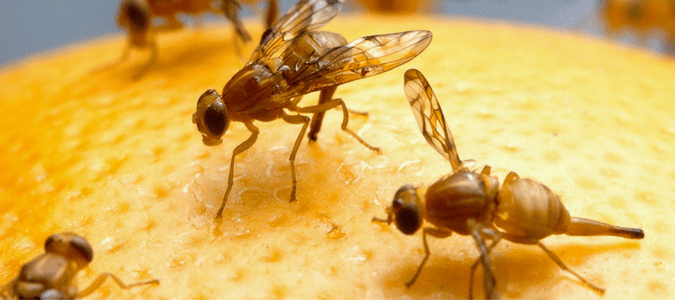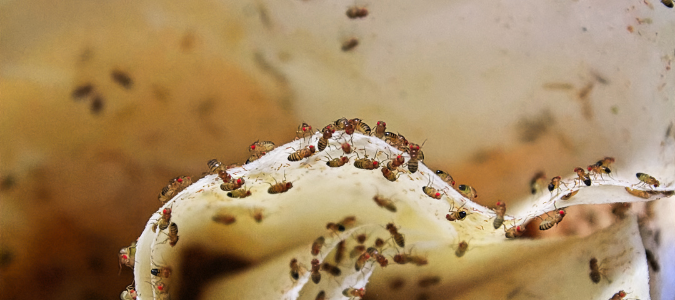What Do Fruit Flies Eat?

Fruit flies may be tiny, but they can cause major annoyance, especially during the warmer months. This is because summertime is when fruit and other produce left out on your counter is most likely to ripen fast and then start to ferment. Of course, fruit flies can infest your home anytime throughout the year.
Ripe and overripe fruits and vegetables attract these tiny household flies. Overripe bananas are a major enticement, but certainly not the only one. Any fruit is fair game. So are potatoes and onions. If you drink a beer and leave some in the bottom of the glass, you’ll attract these pests. The same is true if you spill a bit of wine on the counter and don’t wipe it up.
Unfortunately, even if you keep all your produce in the refrigerator and wipe up all spills, you can still have fruit fly problems. Another major spot for fruit fly activity is compost, recycling and garbage bins that are indoors. The bits of food and sugary liquids present in these bins can attract fruit flies.
Another common infestation spot is sink drains. If you have a disposal in your kitchen sink, bits of food stick to the underside of the rubber splash guard when you run it. Fruit flies can feed on these food particles and the residual water in the sink. These pests can even infest the drains in bathroom sinks and showers. The hair and soap scum can provide enough organic matter to feed the tiny flies.
Getting Rid of Fruit Flies
Getting rid of fruit flies is more about removing whatever attracts them to your home than eliminating the pests themselves. Essentially, getting rid of their feeding and breeding grounds is essential to controlling their populations.
Fortunately, there are several steps Texas homeowners can take to get rid of fruit flies:
- Keep all produce in the refrigerator instead of on the counter or in the pantry. This is especially important in spring and summer when fruits and vegetables ripen more quickly than in cooler seasons.
- Be sure to wipe up spills, especially fruit juice or alcohol.
- Clean out the sink daily with soap, water and a good scrub brush. You can also use a long-handled brush to scrub the underside of the disposal’s rubber splash guard, to remove as much gunk as possible.
- If you have fruit flies hovering around the drain, you need a deeper cleaning. You can pour a mixture of one cup each of vinegar and baking soda into the sink, letting it sit for at least a half-hour before flushing it down with hot water.
- Create a fruit fly trap by putting a piece of ripe banana or other fruit into a container, and covering it tightly with plastic wrap. Then poke several tiny holes in the plastic wrap with a toothpick. This scent will attract fruit flies. They will find their way into the container through the holes, but they won’t be able to get back out.
- Another fruit fly trap that sometimes works is setting out a bowl of apple cider vinegar with a few drops of liquid dish soap mixed in. The flies will be attracted to the vinegar especially if it sits out for several days. The soap breaks the surface tension of the liquid, causing the flies to fall through and drown.
- Keep indoor garbage, recycling and compost bins clean. Wiping them down every time you empty them helps keep fruit flies and other pests away.
- Replace old sponges and mops with new ones, and do your best to rinse them well and let them dry out completely between uses.
If you take these steps and still have a fruit fly problem, it may be that your pipes’ p-trap needs replacing. This is the U-shaped portion of the pipes under your kitchen sink. This is a relatively simple job for experienced DIY homeowners, but it’s a good idea to hire a professional plumber.
Hiring a pest control professional is also the best way to resolve fruit fly problems, especially if you have an ongoing infestation. A pest control specialist will conduct a thorough inspection of your home, find all signs of fruit fly and other pest activity, and discuss treatment and prevention options with you.

Where Do Fruit Flies Lay Eggs?
Fruit flies feed on fruit, and they can make a real nuisance of themselves in a kitchen if they can find spots for breeding. But where do fruit flies lay eggs? The somewhat disgusting answer is that they lay their eggs right in fruit. These pests find small wounds or openings on the surface of a piece of fruit and lay their eggs right in the split. That way, once the larvae hatch, they have an instant, ready food source available.
A female fruit fly can lay over 500 eggs at a time. These eggs are too small to see with the naked eye, but if you looked at them under a microscope, you would see what looked a bit like yellowish grains of rice.
Once the eggs hatch into larvae, the larvae stay where they are for several days, eating their ready-made fruit meal. Then they find dark, protected spots to become pupae. It takes just a few more days for the pupae to transform into fully grown adult fruit flies. Just two days after the adult fruit flies emerge, they are ready to mate and lay eggs of their own.
With such a quick life cycle, it’s easy to see how a fruit fly infestation can quickly grow out of control. This is why it’s so important to stay on top of the steps you can take to prevent fruit flies. These include keeping all fruits and vegetables in the refrigerator and keeping your kitchen sink and counters clean.
In the case of a full-blown pest infestation, of course, these measures may not be enough. In that case, it’s time to call in a pest control professional. A pro can determine the best combination of treatments to get rid of the fruit flies and ensure that they don’t return.

What to Do About a Fruit Fly Infestation
As far as pest infestations go, a fruit fly infestation isn’t necessarily a particular safety or health concern. Fruit flies are widely considered a nuisance pest. This means they are more annoying than dangerous, and they aren’t known to carry diseases. Still, these tiny pests multiply amazingly fast, and they can be maddeningly hard to get rid of when they take over your kitchen.
If you think you’re dealing with a fruit fly infestation, the first thing to do is to make sure you’re actually dealing with fruit flies. There are other small pests, like fungus gnats, that are often mistaken for fruit flies.
The most common and noticeable sign of a fruit fly infestation is adult fruit flies flying around the kitchen. You’ll probably see them hovering around fruit kept on the counter, or around the sink. They might also hover around waste bins if you throw out food scraps and don’t use well-fitting lids on your garbage and compost cans.
You might also notice fruit fly pupae clustered on produce or in other areas. Fruit fly pupae are about five millimeters long, so they are small yet visible to the naked eye. If you aren’t sure whether you’re dealing with fruit flies or something else, a pest control professional can thoroughly inspect your home and make an accurate identification of the pest you’re dealing with.
Reducing the Fruit Flies in Your Home
If you do have a fruit fly problem, there are several steps you can take to keep these pests’ populations as low as possible. Since fruit flies both feed on and breed in ripe fruits and vegetables, keep all produce in the refrigerator instead of out on the counter. Wipe up fruit juice spills as soon as they happen, and keep your sink and counters clean. It’s also a good idea to keep indoor garbage, recycling and compost bins as clean as possible between uses.
In many homes, these steps will help but can’t ultimately get rid of a full-blown fruit fly infestation. For that, you’ll need professional help from a pest control specialist. A pro can find every spot where fruit flies are breeding. They will then determine the right treatments to use in order to get rid of these pests, so you can have your kitchen back.
Chem-Free Can Resolve Your Fruit Fly Problem
Since they multiply extremely fast, fruit flies can quickly become a major annoyance in your home. If you’re struggling with fruit flies in your home, call on Chem-free. Our expert pest control technicians can identify the source of your problem and suggest low-impact intervention methods to protect your family and pets from the hassle of these pests.
Need Help Managing Pests?
Chem-Free offers both effective, low-impact pest control options and preventative measures to help avoid future infestations. Contact us today for a free estimate!


